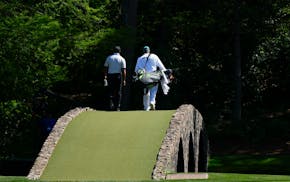Matt Cassel's return to the Vikings sets up so many juicy possibilities.
The team is now one signing away from putting the band back together. If they can just re-sign Josh Freeman, they'll have Cassel, Freeman and Ponder all under contract, negating the chance of any of their competitors stealing the magic formula of the 2013 Minnesota Vikings, or what Vikings receivers called, "Hunger Games: Catching Nothing."
The team can now lure fans to buy tickets to the next two seasons. Imagine: Getting to watch Cassel and Ponder in subzero weather at an outdoor college stadium. The price of one game: $100. The price of two games: $50.
OK, that's not fair. The Cassel signing is rational. He played pretty well last year, and handled himself like a pro even when forced to watch Ponder throw at the feet of receivers and Freeman throw at the feet of concessionaires.
What's most important about the Cassel signing is that it allows the Vikings to maneuver. With Cassel capable of starting or relieving, the Vikings can cut Ponder if they want. They can spend a high draft pick on their latest quarterback of the future and know they won't have to rush him into action.
And here's a thought that might infuriate Vikings fans desperate to draft and develop their own Russell Wilson or Aaron Rodgers: The Vikings have done pretty well signing veteran quarterbacks. Their Plan Bs have worked out better than a lot of teams' Plan As.
Before Denny Green arrived, the Vikings tried to develop their own quarterbacks. Green's impatience changed the organizational philosophy.
When he ran off the promising Rich Gannon in favor of the perplexing Sean Salisbury, Green was forced to scramble. His teams were competitive enough that he never had a chance to draft a blue-chip quarterback at the top of the draft, and competitive enough that he was always searching for the next quarterback who might immediately take him to the playoffs.
Green brought in Jim McMahon, who was mediocre for one season, and then Warren Moon, who was effective for two. When Brad Johnson's run as a homegrown starter ended with a foot injury early in the 1998 season, backup Randall Cunningham took the Vikings to the NFC title game. Cunningham lost the job to another retread, Jeff George, in '99.
After Daunte Culpepper's rise and fall, the Vikings again drafted a quarterback of the future (Tarvaris Jackson) who again gave way to a couple of veterans. Gus Frerotte was productive in 2008 and Brett Favre took the Vikings to the brink of the Super Bowl in '09.
That timeline is troubling for those who compare the Vikings to Super Bowl champions, because 10 of the last 11 champions have won with a quarterback they drafted.
But for every home-grown quarterback who wins a Super Bowl, there are dozens if not hundreds who fail.
Instead of constantly comparing the Vikings' quarterbacks of the last 20 years to outliers like Wilson and Rodgers, perhaps it would be more educational to compare the Vikings' approach to that of a team that has invested multiple first-round draft picks in franchise quarterbacks.
In 2001, Team X selected a talented passer — call him Quarterback A - with the first pick in the second round. The quarterback became a star. In 2004, Team X used the fourth pick in the first round to select Quarterback B. Quarterback A left in free agency. Quarterback B became a star for a franchise that, like the 1998 and 2009 Vikings, was considered to have one of the deepest and most talented rosters in the NFL not long ago.
Team X must have won a Super Bowl or two, right?
Wrong. Team X is the San Diego Chargers. The Chargers drafted Drew Brees and Philip Rivers. They have won four playoff games and reached zero Super Bowls with those two at quarterback. Favre and Cunningham came closer to taking the Vikings to the Super Bowl than Brees and Rivers with the Chargers.
Cassel might work as a temp. He might work as a mentor.
The Vikings could have done worse. Many teams have.
The Vikings have suffered only six losing seasons since 1990. Two of those six losing seasons occurred as they were breaking in a first-round draft pick named Culpepper. Two more occurred as they tried to develop a first-rounder named Ponder.
Cassel was the right choice for a team looking to draft a quarterback. Vikings history suggests he might even be the right choice if they draft a bad one.
Jim Souhan can be heard weekdays at noon and Sundays from 10 to noon on 1500 ESPN. His Twitter name is @SouhanStrib. jsouhan@startribune.com

Souhan: Why Tiger Woods should keep swinging
Souhan: Scheffler wins Masters again, shows what makes him special
Morikawa falters in final round at Masters

Keeping up with the Joneses who helped design Augusta National's classic back nine


